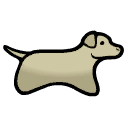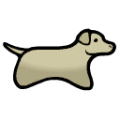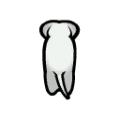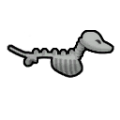Difference between revisions of "Labrador retriever"
m |
|||
| (8 intermediate revisions by 4 users not shown) | |||
| Line 1: | Line 1: | ||
| + | {{Image wanted|reason=Colored versions of the other angles}} | ||
{{Infobox main|animal | {{Infobox main|animal | ||
| name = Labrador retriever | | name = Labrador retriever | ||
| − | | image = | + | | image = Labrador retriever.png |
| description = A very versatile, medium-sized dog. Originally bred to retrieve birds shot on the hunt, the lab is also an excellent guard dog, play pal, and family friend. | | description = A very versatile, medium-sized dog. Originally bred to retrieve birds shot on the hunt, the lab is also an excellent guard dog, play pal, and family friend. | ||
| type = Animal | | type = Animal | ||
| Line 9: | Line 10: | ||
| flammability = 0.7 | | flammability = 0.7 | ||
| marketvalue = 250 | | marketvalue = 250 | ||
| + | | combatPower = 70 | ||
| bodysize = 0.75 | | bodysize = 0.75 | ||
| healthscale = 1 | | healthscale = 1 | ||
| hungerrate = 0.4 | | hungerrate = 0.4 | ||
| − | | diet = omnivorous | + | | diet = omnivorous, ovivorous |
| leathername = dog leather | | leathername = dog leather | ||
| wildness = 0 | | wildness = 0 | ||
| Line 47: | Line 49: | ||
| attack4chancefactor = 0.2 | | attack4chancefactor = 0.2 | ||
}} | }} | ||
| − | {{Info|'''Labrador retrievers''' are a | + | {{Info|'''Labrador retrievers''', called '''labrador puppies''' as babies, are a type of trainable [[dog]]. They are sometimes selected as the starter animal.}} |
== Analysis == | == Analysis == | ||
| − | + | Labs and [[husky|huskies]] are strong candidates for hauler animals. Both are easy to tame, don't require a minimum skill to train, and don't ever lose training over time. With 0 wildness, they do not generate [[filth]]. As omnivores, they can eat meals, [[kibble]], or any food you have lying around. A downside is that they can be hunted by predator animals, as opposed to [[cougar]]s and [[bear]]s. | |
| − | + | Compared to the husky, a labrador is less combat effective ({{#show:Labrador retriever|?Mob Average DPS}} vs {{#show:Husky|?Mob Average DPS}}), eats less ({{#show:Labrador retriever|?Real Hunger Rate}} vs {{#show:Husky|?Real Hunger Rate}}), carries slightly less ({{#show:Labrador retriever|?Carrying Capacity}} vs {{#show:Husky|?Carrying Capacity}}), and has slightly more puppies per litter ({{#show:Labrador retriever|?Average Offspring Per Birth}} vs {{#show:Husky|?Average Offspring Per Birth}}). | |
| − | + | Labs are one of the few animals that can [[nuzzle]] colonists, giving a {{+|4}} ''Nuzzled'' moodlet to colonists. | |
== Training == | == Training == | ||
| Line 60: | Line 62: | ||
== Health == | == Health == | ||
| − | {{Animal Health Table}} | + | {{Animal Health Table|QuadrupedAnimalWithPawsAndTail}} |
| + | |||
| + | == Gallery == | ||
| + | <gallery> | ||
| + | Labrador retriever.png|Labrador facing east | ||
| + | Labrador north.png|Labrador facing north | ||
| + | Labrador south.png|Labrador facing south | ||
| + | Dessicated labrador east.png|Labrador decaying | ||
| + | </gallery> | ||
== Version history == | == Version history == | ||
* [[Version/0.12.906|0.12.906]] - Added | * [[Version/0.12.906|0.12.906]] - Added | ||
| − | {{ | + | |
| + | {{Nav|animal}} | ||
[[Category:Animals]] | [[Category:Animals]] | ||
[[Category:Pet]] | [[Category:Pet]] | ||
Latest revision as of 00:53, 16 July 2024
| This page could use some more or updated images. You can help RimWorld Wiki by uploading images to make this page better. Note: Colored versions of the other angles. |
Labrador retriever
A very versatile, medium-sized dog. Originally bred to retrieve birds shot on the hunt, the lab is also an excellent guard dog, play pal, and family friend.
Base Stats
- Type
- Animal
- Flammability
- 70%
Pawn Stats
- Combat Power
- 70
- Move Speed
- 5 c/s
- Health Scale
- 100% HP
- Body Size
- 0.75
- Mass - Baby
- 9 kg
- Mass - Juvenile
- 22.5 kg
- Mass - Adult
- 45 kg
- Carrying Capacity
- 56 kg
- Filth Rate
- 1
- Hunger Rate
- 0.64 Nutrition/Day
- Diet
- omnivorous, ovivorous
- Life Expectancy
- 12 years
- Manhunter Chance
- 0%
- Manhunter Chance (Taming)
- 0%
- Trainable Intelligence
- Advanced
- Wildness
- 0%
- Nuzzle Interval
- 12 hours
- Mate Interval
- 12 hours
- Maturity Age
- 0.5 years (30 days)
- Juvenile Age
- 0.25 years (15 days)
- Comfortable Temp Range
- -30 °C – 40 °C (-22 °F – 104 °F)
Production
- Meat Yield
- 105
 labrador retriever meat
labrador retriever meat - Leather Yield
- 33
 dog leather
dog leather - Gestation Period
- 10 days
- Offspring Per Birth
- 1-3 (1.937 avg)
Melee Combat
- Attack 1
- Front left paw
8.5 dmg (Scratch)
13 % AP
2 second cooldown - Attack 2
- Front right paw
8.5 dmg (Scratch)
13 % AP
2 second cooldown - Attack 3
- Teeth
14.2 dmg (Bite)
21 % AP
2.6 second cooldown
0.7 chance factor - Attack 4
- Head
5 dmg (Blunt)
7 % AP
2 second cooldown
0.2 chance factor - Average DPS
- 2.55
- tradeTags
- AnimalPet, AnimalCommon
Labrador retrievers, called labrador puppies as babies, are a type of trainable dog. They are sometimes selected as the starter animal.
Analysis[edit]
Labs and huskies are strong candidates for hauler animals. Both are easy to tame, don't require a minimum skill to train, and don't ever lose training over time. With 0 wildness, they do not generate filth. As omnivores, they can eat meals, kibble, or any food you have lying around. A downside is that they can be hunted by predator animals, as opposed to cougars and bears.
Compared to the husky, a labrador is less combat effective (2.55 vs 2.82), eats less (0.64 vs 0.8), carries slightly less (56 vs 65), and has slightly more puppies per litter (1.937 vs 1.721).
Labs are one of the few animals that can nuzzle colonists, giving a +4 Nuzzled moodlet to colonists.
Training[edit]
This animal can be trained as follows:
| Guard: | |
|---|---|
| Attack: | |
| Rescue: | |
| Haul: | |
*As of version 1.1.2610, all animals can be tamed. The percentage of likelihood of success depends on factors such as the Animals Wildness Percentage, Pawn Handling Skill, and others. More information can be found on the animals page.
Health[edit]
| Part Name | Health | Quantity | Coverage[1] | Target Chance[2] | Subpart of | Internal | Capacity[3] | Effect if Destroyed/Removed |
|---|---|---|---|---|---|---|---|---|
| Body | 40 | 1 | 100% | 21% | N/A[4] | - | Death | |
| Tail | 10 | 1 | 7% | 7% | Body | - | - | |
| Spine | 25 | 1 | 3% | 3% | Body | Moving |
−100% Moving[5] | |
| Stomach | 20 | 1 | 3% | 3% | Body | Digestion |
−50% Digestion | |
| Heart | 15 | 1 | 3% | 3% | Body | Blood Pumping |
Death | |
| Lung | 15 | 2 | 3% | 3% | Body | Breathing |
−50% Breathing. Death if both lost. | |
| Kidney | 15 | 2 | 3% | 3% | Body | Blood Filtration | −50% Blood Filtration. Death if both lost. | |
| Liver | 20 | 1 | 3% | 3% | Body | Digestion |
Death | |
| Neck | 25 | 1 | 20% | 5% | Body | Eating Talking Breathing |
Death | |
| Head | 25 | 1 | 75% | 2.25% | Neck | - | Death | |
| Skull | 25 | 1 | 25% | 1.125% | Head | - | Cannot be destroyed Increasing Pain based on damage. | |
| Brain | 10 | 1 | 70% | 2.625% | Skull | Consciousness |
Death Damage always results in scarring. | |
| Eye | 10 | 2 | 12% | 1.8% | Head | Sight |
−25% Sight. −100% if both lost. Damage always results in scarring. 0% Hit Chance against Blunt damage. | |
| Ear | 12 | 2 | 8% | 1.2% | Head | Hearing |
−25% Hearing. −100% if both lost. | |
| Nose | 10 | 1 | 10% | 1.5% | Head | - | - | |
| AnimalJaw | 10 | 1 | 10% | 1.5% | Head | Manipulation |
−100% Manipulation. Can no longer use Bite attack. | |
| Front Leg | 30 | 2 | 7% | 5.95% | Body | Moving |
−25% Moving. −50% if both lost. Can no longer use paw attack.[6] | |
| Front Paw | 10 | 2 | 15% | 1.05% | Front Leg | Moving |
−25% Moving. −50% if both lost. Can no longer use paw attack. | |
| Rear Leg | 30 | 2 | 7% | 5.95% | Body | Moving |
−25% Moving. −50% if both lost. | |
| Rear Paw | 10 | 2 | 15% | 1.05% | Rear Leg | Moving |
−25% Moving. −50% if both lost. |
- ↑ Coverage determines the chance to hit this body part. It refers to the percentage of the super-part that this part covers, before its own sub-parts claim their own percentage. For example, if the base coverage of the super-part is 100%, and the coverage of the part is 20%, 20% of hits would hit the part, and 80% the super-part. If the part had its own sub-part with 50% coverage, the chances would be 10% sub-part, 10% part, 80% super part.
- ↑ Target Chance is the actual chance for each part to be be selected as the target when each part's coverage has been taken into account(I.E. Neck covers 7.5% of Torso but Head covers 80% of Neck so it actually has only a 1.5% chance to be selected). This is not pure hit chance, as different damage types propagate damage in different ways. See that page for details.
- ↑ Note that capacities can affect other capacities in turn. Only the primary effect is listed. See specific pages for details.
- ↑ This is the part that everything else connects to to be considered 'connected'.
- ↑ If Moving drops below 16% a pawn cannot move.
- ↑ A Scratch attack that varies from animal to animal. Each front paw allows one attack.
Gallery[edit]
Version history[edit]
- 0.12.906 - Added




